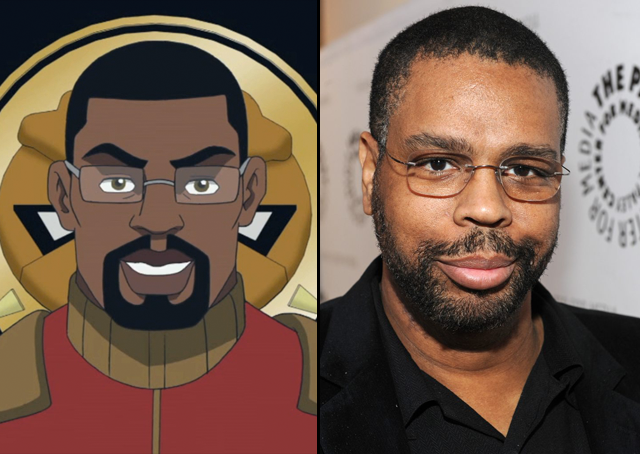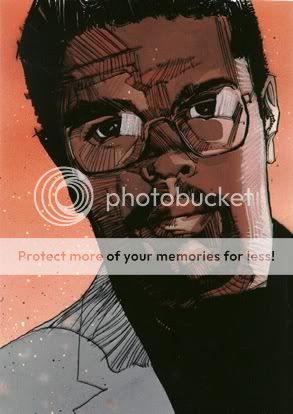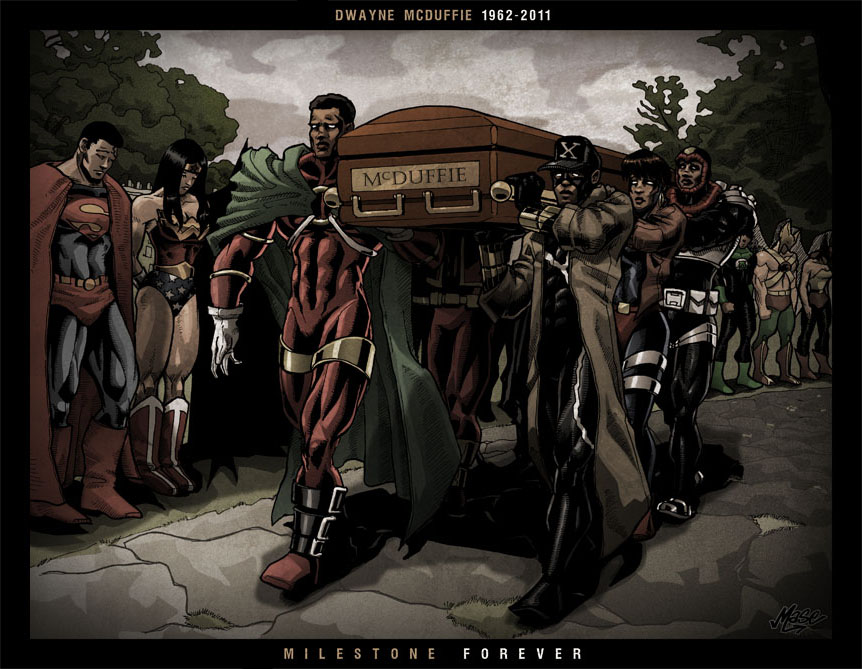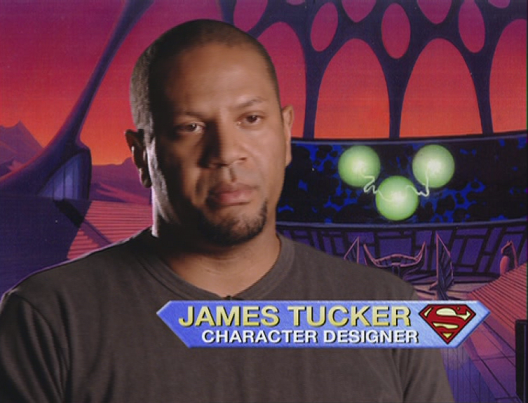“Catching Lightning in a Bottle (and Other Moral Victories)”
February 4th, 2013 | Posted by Eugene Son in Columns and Essays
Dwayne wrote this, explaining-
“Catching Lightning in a Bottle” is both an introduction to the STATIC SHOCK: TRIAL BY FIRE compilation, it also sort of serves as a FAQ about the origins of the character.
Catching Lightning in a Bottle (and Other Moral Victories)
If you’re a STATIC fan from back in the day, it’s good to see you again. I know we’ve got a lot of catching up to do but first I want to welcome our new readers, who probably only know about Static from the TV show. I’m going to take a moment and bring them up to speed. I know, I know but we’ve waited over three years for this moment, what’s another few hundred words? Just bear with me, won’t you?
I have a good friend who is fond of repeating the aphorism, “moral victories don’t count.” I couldn’t disagree more, not only do they count but in the long run, they’re the only kind that matter. Case in point: Milestone Comics. In 1992, I joined forces with three extraordinary men, together we set out to change the face of the comic book industry. This proved to be somewhat more difficult than we had anticipated.
Although Milestone’s sales were always respectable, we never set the world on fire. Our books lacked the speculator heat and collectable foil covers that drove the market in those days. Moreover a small but vocal group of people, including some readers, retailers and fellow professionals, found our very existence suspect. All sorts of bizarre, even sinister, motives were attributed to us. We battled against those impressions when we had the time but mostly we kept our eye on the ball. We figured our product would speak for itself, if we got it out there. So we did, every month for five years. Good comics, exactly the way we wanted to do them. Moral victory, folks.
Milestone’s story is an adventure worthy of any of our heroes. Against enormous odds we set out to accomplish something both unprecedented and important. The results were 250 comics that respected our readers’ intelligence, from a company dedicated to the idea that if you want fresh water, you have to draw from new wells. STATIC is character-driven, exciting, inventive and above all fun, as good an example of our values as one could choose. It’s a particularly fitting standard-bearer for what we hope will be Milestone’s 21st century renaissance. With the rebirth of STATIC as STATIC SHOCK!, the adventure continues.
STATIC SHOCK!: TRIAL BY FIRE is the long-overdue collection of the first four issues of the late, lamented STATIC monthly comic, created by Milestone and distributed by our long-time partners at DC Comics. In my years as Milestone’s Editor-In-Chief, I’ve made my share of mistakes, ask anybody. But on occasion, I’ve also shown flashes of inexplicable brilliance. STATIC was the occasion for a number of such flashes. I had already written the series bible (which included beautiful character designs by co-creator Denys Cowan) as well as Static’s origin story arc for the first four issues when I belatedly realized that there was no way I could write four books a month (I was already writing HARDWARE and ICON and co-writing BLOOD SYNDICATE) while simultaneously learning how to run a comic book company. I needed help. That’s when I had my first really good idea.
I’ve known Robert L. Washington III since he was about eight years old. Even as a child he was one of the most brilliantly creative people I’d ever met. I’d caught up with Bob again after he grew up and moved to New York. Only a couple years earlier, I’d introduced him around at Marvel Comics. He’d had a couple of nibbles but hadn’t yet landed a major assignment. All the better for me.
Bob took my outline and ran with it, adding his own totally unique spin to STATIC. In addition to frequently topping my one-liners with better ones, he reworked our villain Hotstreak (you probably know him as F-Stop), adding the very cool gimmick that Static deduces in issue #2. He created Tarmack out of whole cloth. He replaced Static’s brother with two sisters (the second sister seems to have gone the way of Richie Cunningham’s big brother on HAPPY DAYS). He gifted Virgil with his own encyclopedic knowledge of comics, sci-fi, gaming and other fan-boy ephemera. And when I told him that I wanted this series to be as much about Virgil and his friends as about Static and his adventures, Bob made me watch about 18 hours of DIGRASSI JR. HIGH. Much cribbing ensued.
After co-scripting the story you’re about to read, I left STATIC in Bob’s obscenely talented hands. If this collection does well, perhaps future volumes will collect Bob’s solo work on this title. I know I’m not alone in my desire to see it all in print.
My second really good idea was listening to my old Milestone partner Michael Davis, who brought to my attention an incredible young artist named John Paul Leon. These days, John is best known as the artist of Alex Ross’ EARTH-X. Back then, all he had was a portfolio full of Xeroxed samples. Really good Xeroxed samples.
I’m told that John doesn’t like to look at his early work anymore. While I’ll stipulate that his talent has grown tremendously since 1993, I don’t care what he says, I adore this stuff. As you will plainly see, when John drew the first four issues of STATIC, he was already a genius. He’s an expert storyteller who creates living, breathing characters. He can draw action and he can draw human drama. He can make a bad scene work and a good scene sing. Best of all, while some of his influences might be apparent, even at this early stage of his career John’s stuff doesn’t look like anyone else’s.
Before I slip a disc from patting myself on the back for all my good ideas, I should direct your attention to the rest of the STATIC team. Veteran inker Steve Mitchell helped our talented newcomer past some of the rough spots and just generally made great pages look even better. Color Editor Noelle C. Giddings hand-painted these comics, routinely achieving the kind of look usually found in top of the line graphic novels. Letterer Steve Hayne somehow found room for way too much dialog and still managed to keep it off of the art. Shawn Martinbrough pitched in with an ink job that foreshadowed his own remarkable talents. STATIC is a three time winner of Parents’ Choice Honors and also racked up 5 on-line fan awards, including two for “best new character.” Hardly surprising results from a team this good.
A final note to our new readers, if you only know Static from the show, you’ll quickly notice some differences between what you’re about to read and the Static you’re acquainted with. Don’t study on it, the differences are superficial. In every important way, this is the Static you’ve come to know and love, only more so. Consider this a hit of uncut funk.
If, after reading TRIAL BY FIRE, you find yourself craving more STATIC SHOCK! (which, of course, you will) you can watch his animated adventures every Saturday on the Kids WB! And if that’s still not enough, I’ve re-teamed with John Paul Leon for the all-new STATIC SHOCK!: REBIRTH OF THE COOL mini-series, on sale very soon. Get it wherever you bought this book.
With the continued support of fans like you, our moral victory can eventually be counted as a victory of the other kind. will our succès d’estime be reborn as a big fat commercial hit? We hope so. And you know what that would mean, right?
More new adventures.
It’s all in your hands again, folks. Enjoy.
Dwayne McDuffie
Chicago, IL
June 8, 2000
Dwayne McDuffie is the co-creator of STATIC, the Milestone Universe and Marvel Comics’ DAMAGE CONTROL. He has written several episodes of the STATIC SHOCK! animated series and continues to serve as Milestone’s Editor-In-Chief.

























































